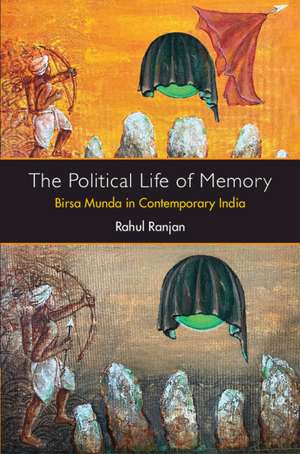The Political Life of Memory: Birsa Munda in Contemporary India
Autor Rahul Ranjanen Limba Engleză Hardback – 10 mai 2023
Preț: 638.42 lei
Preț vechi: 717.33 lei
-11% Nou
Puncte Express: 958
Preț estimativ în valută:
122.16€ • 133.23$ • 103.01£
122.16€ • 133.23$ • 103.01£
Carte tipărită la comandă
Livrare economică 24 aprilie-08 mai
Preluare comenzi: 021 569.72.76
Specificații
ISBN-13: 9781009337908
ISBN-10: 1009337904
Pagini: 320
Dimensiuni: 161 x 236 x 23 mm
Greutate: 0.52 kg
Editura: Cambridge University Press
Colecția Cambridge University Press
Locul publicării:Cambridge, United Kingdom
ISBN-10: 1009337904
Pagini: 320
Dimensiuni: 161 x 236 x 23 mm
Greutate: 0.52 kg
Editura: Cambridge University Press
Colecția Cambridge University Press
Locul publicării:Cambridge, United Kingdom
Cuprins
Abbreviations; Glossary of Hindi Terms; List of Illustrations; Preface; 1. Introduction; 2. Claiming the Munda Raj from the Margins: Land, Missionaries, and the Making of Birsa Ulgulan in Chota Nagpur (1845–1900); 3. Memories Set in Stone: Political Aesthetics and the Statue of Birsa Munda in Postcolonial Jharkhand; 4. 'Burying the Dead, Creating the Past': The Making of Memorials, Stone Slabs and Birsa in Jharkhand; 5. Echoes from the Graveyard: Pathalgadi, Birsaites and the Landscape of Memory; 6. Conclusion; Manifesto: Script for the Counter-memorial; Manifesto: Pathways to Anticolonialism, and Thinking about Subaltern Present Past; Appendix; Primary Sources; Published Sources.
Recenzii
'This monograph is Dr Ranjan's first foray into the realm of memory studies. For him, it is a realm that animates three phenomena: politics, landscapes and beliefs. Dr Rajan is a gifted anthropologist. His capacity to involve diverse voices has yielded a rich series of insights. These pertain to the political and cultural afterlives of Birsa Munda, an infamous Adivasi revolutionary from the pre-independence era. Dr Ranjan weaves together the variously social, ideological, aesthetic, archival and religious dimensions of this freedom-fighter's posthumous significance. He carefully documents cultures of memorialisation and counter-memory, and uses Subaltern Studies frameworks to address issues like identity-assertion, legal pluralism and inequality. How are narratives of Adivasi resistance, power and belonging configured and reconfigured in modern India? To find out, let us now listen to someone who knows how to listen.' Daniel J. Rycroft, University of East Anglia
'An important contribution to recognise the lasting relevance and significance of Birsa Munda for the Indian polity, political science and historiography, a contribution that listens to the subaltern voices rarely heard, and that pays due attention to the politics of memory in the continuing resistance and struggles of indigenous people.' Alpa Shah, London School of Economics
'So much has been written on Birsa Munda and his movement that one wonders if anything new could come from another study on it. Yet the volume dispels this thought. It is an exceptional work that not only provides a fascinating account of the memory of Birsa Munda and his struggle in post-colonial Jharkhand but also contrasts ways and forms the memory assumes in the practices of the state and the life world of the Adivasis. The latter live it in their everyday life and movements. This book, therefore, is a pioneering and fascinating engagement with the hitherto unexplored area of subaltern memory politics in Jharkhand.' Virginius Xaxa, Visiting Professor, Institute for Human Development
'An important contribution to recognise the lasting relevance and significance of Birsa Munda for the Indian polity, political science and historiography, a contribution that listens to the subaltern voices rarely heard, and that pays due attention to the politics of memory in the continuing resistance and struggles of indigenous people.' Alpa Shah, London School of Economics
'So much has been written on Birsa Munda and his movement that one wonders if anything new could come from another study on it. Yet the volume dispels this thought. It is an exceptional work that not only provides a fascinating account of the memory of Birsa Munda and his struggle in post-colonial Jharkhand but also contrasts ways and forms the memory assumes in the practices of the state and the life world of the Adivasis. The latter live it in their everyday life and movements. This book, therefore, is a pioneering and fascinating engagement with the hitherto unexplored area of subaltern memory politics in Jharkhand.' Virginius Xaxa, Visiting Professor, Institute for Human Development
Notă biografică
Descriere
Situating Birsa Munda as the canon, the book demonstrates how political parties and civil societies mobilise and reproduce his memory.
